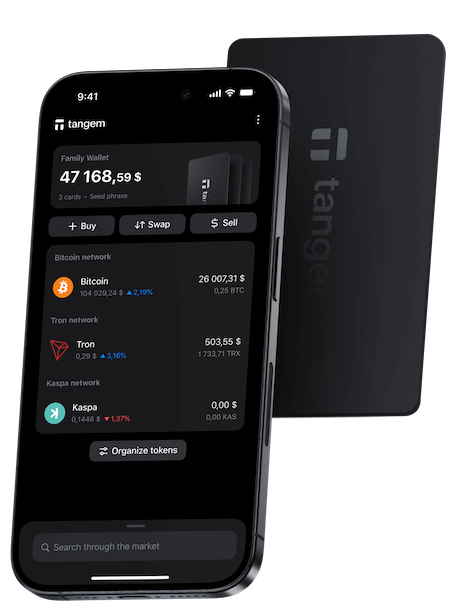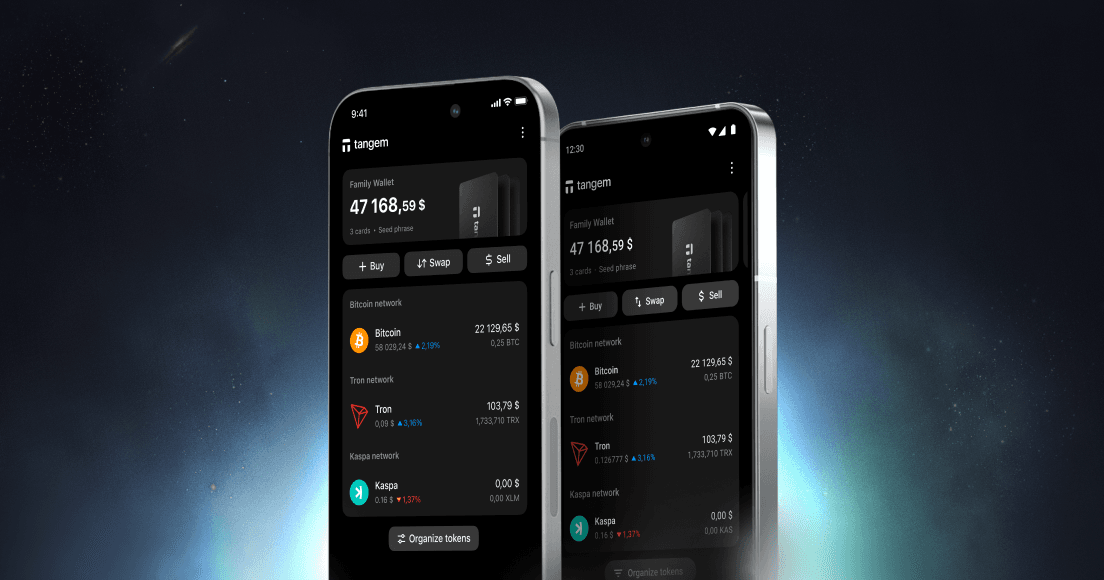
Jeff wallet
The most secure hardware wallet for your Jeff
Elevate your Jeff security with Tangem. Join countless savvy users enjoying peace of mind.

How to secure your Jeff with Tangem?
When you buy or hold Jeff in Tangem, it secures your private keys in many ways:
- With the seedless setup and smart backups on extra devices, your Bitcoin is safe and accessible only to you.
- Tangem is IP69K water and dustproof, built to protect against extreme temperatures, EMPs, ESCs, and X-RAYS.
- An access code and biometric authentication protect against unauthorized access.
- Private keys are generated and stored on its EAL6+ CC secure element.
How to get a Jeff Crypto Wallet?
Tangem products are for everyone, from beginners to experts. They keep your crypto safe and easy to manage. With cutting-edge technology, Tangem lets you control and protect your digital assets.
Get TangemWhy choose Jeff wallet with Tangem.
What is Jeff (JEFF)?
Jeff, also known as JEFF, is a cryptocurrency crafted to entice investors with the prospect of dramatic returns. It's particularly appealing to those in pursuit of a 100x profit on their investments, standing out as a token with the potential to significantly enhance one's crypto portfolio.
What is a Jeff wallet?
A Jeff wallet functions by safeguarding your private keys, essential for handling your Jeff address. Though it doesn't store the Jeff tokens themselves, your cryptocurrencies remain securely on the blockchain. The wallet's main role is to generate and keep these private keys safe, allowing you seamless access and management of your Jeff holdings. Essentially, a Jeff wallet serves as your tool for storing, sending, and managing your Jeff assets.
How does a Jeff wallet work?
Jeff wallets leverage public and private key pairings to govern blockchain accounts. It's crucial to keep your private key private, as it grants access to a specific Jeff account, while sharing your public key allows for receiving JEFF. Withdrawing funds necessitates the private key's input. Tangem Wallet generates and diligently stores these private keys within its chip.
What are the types of Jeff wallets?
Exchange Jeff Wallets:
Platforms like Coinbase, Binance, and Kraken enable the purchase of JEFF with traditional money through custodial wallets. However, this poses a risk of losing account access.Software Jeff Wallets:
Installed software on devices that handle JEFF and its private keys. While user-friendly, they are susceptible to malware and cyber threats. Includes mobile, desktop, and browser versions.Mobile Jeff Wallets:
Applications designed for managing JEFF directly on smartphones.Desktop Jeff Wallets:
Software installed on PCs, keeping private keys on hard drives or SSDs.Hardware Jeff Wallets:
Tangem and other offline solutions provide a robust defense against online vulnerabilities.
How to Choose the Best Jeff Wallet
Selecting the best wallet revolves around personal preferences, focusing on ease of use, dependability, durability, and security. For safeguarding large sums from online hazards, a hardware wallet like Tangem is highly recommended.

Tangem supports other cryptocurrencies
Reliability and convenience at your fingertips. Manage thousands of cryptocurrencies with peace of mind anywhere and anytime
See all supported cryptosJeff FAQ
- For storing and using JEFF, Tangem Wallet is a strong choice thanks to its offline key storage and mobile-friendly design.
- You can use most software wallets at no cost. Hardware wallets, which offer additional security, must be purchased separately. Network fees may still apply.
- The safest Jeff wallet keeps your private keys offline and protected from unauthorized access. Hardware wallets, such as Tangem, offer the highest level of protection because they isolate keys from online risks.
- A Jeff wallet is a tool that lets you store, send, and receive your digital assets. It manages your private keys, which prove ownership of your JEFF.

